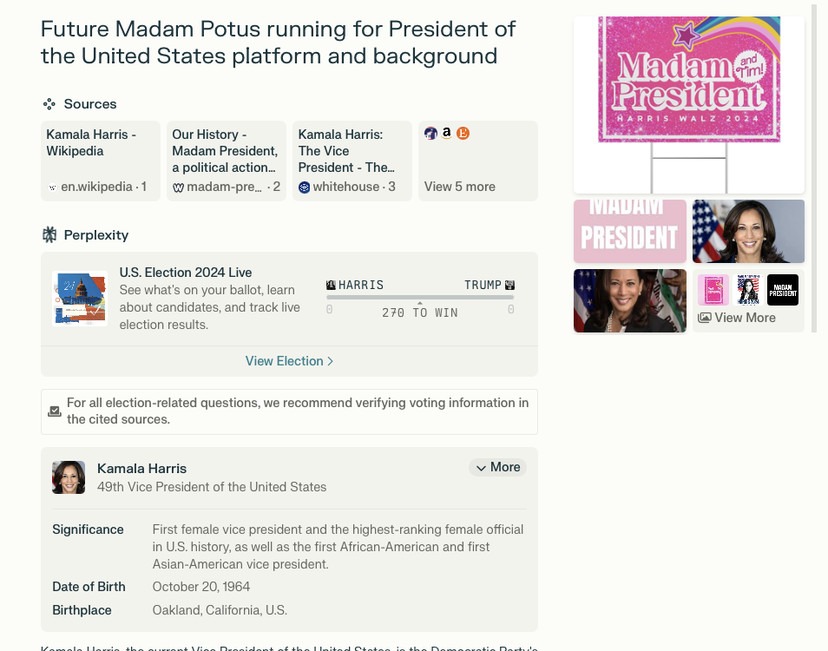AI search company Perplexity is experimenting with the application of artificial intelligence in delivering essential voting information through its newly launched Election Information Hub, announced on Friday. This hub is designed to provide a variety of services, including AI-generated responses to common voting questions and summaries of candidates. Notably, on November 5th, Election Day, the platform will also offer live updates on vote counts by utilizing data sourced from The Associated Press.
According to Perplexity, the voter information it provides—such as polling requirements, locations, and hours—is derived from data collected by Democracy Works, the same organization that supports comparable features for Google. The company emphasizes that its election-related answers originate from “a curated set of the most trustworthy and informative sources.”
Sara Platnick, a spokesperson for Perplexity, confirmed in an email to The Verge that both The Associated Press and Democracy Works are official partners in this initiative. Platnick elaborated on the company’s approach to sourcing information, stating:
“We selected domains that are non-partisan and fact-checked, including Ballotpedia and reputable news organizations. We’re actively monitoring our systems to ensure that we continue to prioritize these sources when answering election-related queries.”
The Election Information Hub provides detailed information about what’s on the ballot based on the location entered by the user, whether that be a specific address or city. The platform also includes tabs to track elections for the President, US Senate, and US House, with results starting to come in on Tuesday. Users can see state-by-state breakdowns indicating the percentage of votes counted and the leading candidates.
However, there have been some inaccuracies in the AI-generated summaries. For instance, when reviewing candidates, the system failed to acknowledge that Robert F. Kennedy, Jr., who is listed on the ballot in my area, had officially withdrawn from the race. Additionally, it referred to a candidate labeled as “Future Madam Potus,” which led to a summary of Vice President Kamala Harris’s candidacy, accompanied by meme-like images that do not typically appear in her standard profile.

Following the publication of this article, Perplexity made updates to the election hub. Write-in candidates are now appropriately identified in the Presidential candidates list, and the platform no longer generates a summary of Vice President Harris when clicking on the “Future Madam Potus” candidate, who, according to Ballotpedia, is indeed a write-in option. Furthermore, Perplexity has started to note that Robert F. Kennedy, Jr. withdrew from the race, although this information is only mentioned at the end of the summary and not consistently throughout.
These inaccuracies highlight the inherent challenges associated with deploying generative AI for a task as critical as providing voting information. The risk of disseminating inaccurate information is particularly concerning in high-stakes situations like elections, which may explain why other AI companies have opted against this approach. For example, ChatGPT, Meta AI, and Google Gemini redirect users seeking voter information to resources like canivote.org or Google Search. Microsoft’s Copilot, on the other hand, simply declined to respond when I inquired about voting information.
As AI continues to evolve and integrate into various sectors, the need for accuracy becomes paramount, especially when it comes to informing citizens about their voting rights and procedures. Perplexity’s efforts to harness AI for this purpose reflect a growing trend among tech companies to provide users with quick and accessible information. However, the issues that have arisen in the Election Information Hub serve as a cautionary tale about the potential pitfalls of relying on generative AI for critical information dissemination.
The implications of this project extend beyond the immediate functionality of the hub. If successful, it could pave the way for similar initiatives that leverage AI to enhance civic engagement and promote informed voting. Conversely, if inaccuracies persist, it may lead to a loss of trust in AI as a reliable source of information, particularly in sensitive areas like elections where the stakes are extraordinarily high.
In summary, Perplexity’s launch of the Election Information Hub is an ambitious attempt to utilize AI for providing essential voting information, including live updates and candidate summaries. While the initiative has potential benefits, the challenges it faces in ensuring the accuracy of its AI-generated content underscore the complexities of using artificial intelligence in high-stakes environments. As the project develops, it will be crucial for Perplexity to address these inaccuracies to build trust and ensure that voters receive the reliable information they need to participate effectively in the democratic process.
